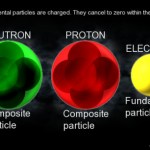symmetry
Imagine looking in the mirror and finding your familiar face reflected back as you've always known it. But as you look more closely, as you precisely examine that mirror image, subtle distortions emerge. The glass itself remains flawless, but real and fundamental differences exist between you and the face that lives on the other side of the looking glass.
Something similar happens in the quantum world when matter is examined against its exotic reflection: antimatter. The analogy is admittedly fanciful, but it's no more dramatic than the dynamics of these almost-twins, which annihilate one…
Medallion
Al Teich
Al Teich's photographs are explorations of symmetry and rhythm that resemble snowflakes, diatoms, or pollen grains. His method fuses old and new technologies: he photographs kaleidoscopes with a digital camera, incrementally moving them to adjust the image. Teich told the Washington Post, "The images are very beautiful but transient. There is an infinite variety of them, but they disappear when you turn the kaleidoscope." Teich, who has a bachelor's degree in physics and a PhD in political science, says "scientists see and enjoy beauty in many things - in science, of…
For those local to Seattle, I'm talking tomorrow in the Paul Allen center:
TIME: 1:30 -- 2:30 pm, Tuesday, Feb 24, 2009
PLACE: CSE 503
SPEAKER: Dave Bacon, University of Washington
TITLE: Symmetry in Quantum Algorithms
ABSTRACT:
Quantum computers can outperform their classical brethren at a variety of algorithmic tasks. Uncovering exactly when quantum computers can exponentially outperform classical computers is one of the central questions facing the theory of quantum algorithms today. In this talk I will argue that a key piece of this puzzle is the role played by symmetry in quantum…
I love The Straight Dope. For 35 years, people have written in and asked some of the most difficult-to-answer questions on any topic you can think of; the staffers, writing under the pseudonym Cecil Adams, do their best to get to the bottom of their questions. Well, they also have a message board, and I saw one of the most difficult questions I've ever seen there:
Where does all the matter in the universe come from?
I'm no[t an] astrophysicist but I understand a little about the Big Bang Theory and also that there's lots of stuff we don't know or probably ever will know about it.
But the…


